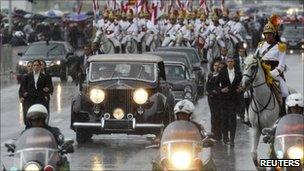Dilma Rousseff sworn in as Brazil's new president
- Published
President Dilma Rousseff: "Poverty still exists and this is a shame on our country"
Brazil's first woman President, Dilma Rousseff, has been sworn into office.
She took over from her mentor, Luiz Inacio Lula da Silva, who stepped down after two terms as the most popular president in the country's history.
After taking the oath of office, Ms Rousseff promised in a speech to protect the most vulnerable in Brazilian society and govern for all.
She also vowed to consolidate the work of her predecessor, who she said had changed the way Brazil was governed.
Brazil's economy has grown strongly in recent years, but it remains one of the most unequal societies in the world.
Ms Rousseff was appointed energy minister in President Lula's government in 2003 and served as his chief of staff from 2005 to 2010.
She was elected in October, defeating the opposition candidate Jose Serra by 56% to 44% in a run-off vote.
She is known to favour a strong state role in strategic areas, including banking, the oil industry and energy.
'All Brazilian women should be proud'
Ms Rousseff's inauguration ceremony at the Brazilian Congress began with a ride past the estimated 70,000 admirers lining the streets of the capital, Brasilia, in a 1952 Rolls Royce.
After signing the oath of office, Ms Rousseff began her 40-minute inaugural address by noting that this was the first time in Brazil that the role of president had been given to a woman.
"I know the historical significance of this decision," she said to widespread applause. "Today, all Brazilian women should feel proud and happy."
Nine of her 37 ministers will be women - a record for Brazil.
Ms Rousseff then said this was "just the beginning of a new era" for Brazil, and promised to protect the most vulnerable in society and "govern for all".
But she also vowed to consolidate the work of her predecessor, who she described as a "great man" who had changed the way the country was governed and encouraged Brazilians to trust in the future of their country.
"The best homage that I can give to him is to continue the progress made by his government, and invest in the strength of the people," she added. "This has been the best lesson that President Lula has given all of us."
Ms Rousseff singled out his work over the last eight years to reduce poverty and promote economic prosperity.
"The most determined struggle will be to eradicate extreme poverty," she said. "We can be a more developed and fairer country."

Rain prevented the roof of Ms Rousseff's open-top Rolls Royce from being opened
"I will not rest while there are Brazilians without food on their table, homeless in the streets, and poor children abandoned to their luck."
She also outlined her plans for tax reforms, environmental protection, improved health services, regional development, and measures to protect the economy from foreign "speculation".
Ms Rousseff later travelled to the presidential palace, where Lula removed the green-and-gold sash of the Brazilian head of state and placed it over her head as thousands of onlookers cheered.
"The happiness I feel for my inauguration is mixed with emotion at seeing him leave," the new president said, wiping tears from her eyes. "But Lula will be with us. I know that the distance of this position won't mean anything to a man of such greatness and generosity."
Lula himself shed a tear while hugging several ministers and aides, before leaving by car to his home near Sao Paulo.
Ms Rousseff, a former Marxist rebel who was imprisoned for three years in the early 1970s for resisting military rule, has promised to protect freedom of expression and worship, and to honour the constitution.
Ms Rousseff faces significant challenges, public health, education and improving the country's infrastructure.
What does Brazil's new president mean for relations with China, US, India and South Africa
Brazil's economy is estimated to have grown by 8% in 2010. However, the currency, the real, has risen so high that it is now making Brazil's exports less competitive.
During his two terms as president from 2002, 30 million people were lifted out of poverty - a major reason for his status as Brazil's most popular president, correspondents say.
During President Rousseff's term, Brazil will host the Rio Plus 20 global environmental summit in 2012 and the Fifa World Cup in 2014. She will also oversee preparations for the Summer Olympics in 2016.
Lula is expected to play an important advisory role to her government.